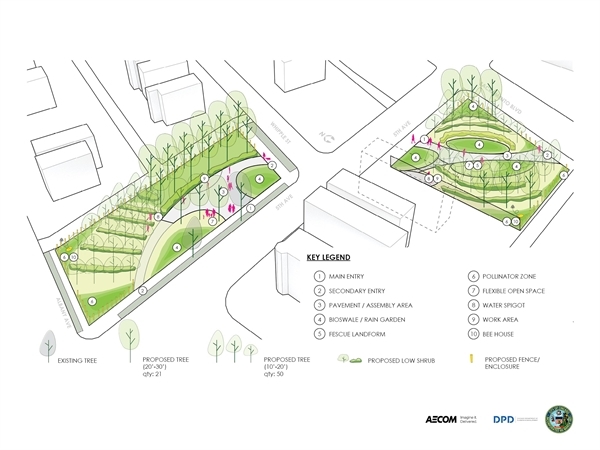A New Community Orchard in Garfield Park Promises Multiple Community Benefits, Highlights Concerns about Gentrification

Participants at a community meeting on September 26th at Marshall High School envision the physical design of a new community orchard that will be built in Garfield Park
Tweet this
In September and October, MPC, in partnership with Elevated Chicago, supported Garfield Park Community Council to bring neighbors and other stakeholders together to help design a new community orchard that will be installed on two City-owned sites on 5th Avenue between Sacramento Boulevard and Albany Avenue. Through this engagement process, participants articulated their vision for the orchard and also considered how this project can help anchor their already existing community in the face of development pressures.
The idea for the orchard emerged more than five years ago when people who shop at the Garfield Park Farmers Market, along with neighbors that grow in community gardens around Garfield Park, started to think about how to meet desire for more locally grown fruit.
The idea for the orchard emerged more than five years ago when people who shop at the Garfield Park Farmers Market, along with neighbors that grow in community gardens around Garfield Park, started to think about how to meet desire for more locally grown fruit. In addition to providing fresh fruit and a place for neighbors to gather, the orchard will also be designed to reduce flooding on surrounding streets and basements.
The City of Chicago Department of Planning and Development (DPD) is using $500,000 in Open Space Impact Fees as well as a $500,000 matching grant from the Metropolitan Water Reclamation District to fund the project, which is part of DPD’s Resilient Corridors initiative. DPD has contracted with AECOM to develop construction drawings, acquire permits, and construct the project, but ultimately the community and Garfield Park Community Council will be responsible for maintenance and programming.
To plan for the orchard, MPC modified the Corridor Development Initiative, a participatory planning process that engages communities in proactively designing for real-world development scenarios. During the meetings in Garfield Park, participants discussed different physical forms they want to see at the orchard; kinds of programs that would be appealing; and their own capacity and willingness to steward. A series of paper and online surveys supplemented the meetings, drawing in additional residents to consider these questions. In the second meeting participants developed visions for the physical design of the orchard, which then informed AECOM to develop two design concepts. At the end of the third meeting, there was consensus to move forward with one of the concepts, shared here.

Through a series of community meetings in September and October, this design was developed for a community orchard in East Garfield Park. The project promises multiple community benefits, though it has also animated fears of gentrification.
The City of Chicago Department of Planning and Development (DPD) is using $500,000 in Open Space Impact Fees as well as a $500,000 matching grant from the Metropolitan Water Reclamation District to fund the project.
While the Corridor Development Initiative process usually includes more open-ended conversations in which participants set priorities for future development for parcels along a corridor, here the focus was on particular lots for which there was an already chosen use—a community orchard. Several participants in meetings expressed concern at the limited scope of the planning process. Specifically, meeting participants as well as respondents to surveys worried that, without plans in place to keep the neighborhood affordable for current residents and businesses, the orchard and other imminent City projects will prompt real estate speculation and, ultimately will lead to their own displacement.
Next steps for the orchard include further refining the design, including working with orchard stewards to select trees and other plants. The City will continue to work with Garfield Park Community Council to communicate updates and to engage residents.
Broader questions of who will be able to live in East Garfield Park and thus enjoy the orchard certainly remain. As the City moves forward with their winning bid to develop a C40 mixed-use residential site at Kedzie and 5th Avenues, just down the street from the orchard, as well as other City-owned sites along these corridors, there will be more opportunity to engage residents and commit to policies and programs that will keep existing residents and businesses in place. MPC will continue to work with Elevated Chicago and will be available to support the City and community in this critical dialogue.